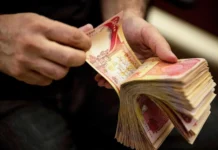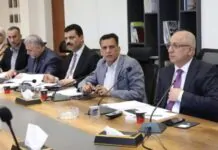Tishwash: Investment Authority: Iraq’s entry into the New York and Singapore agreements achieves its transition by attracting funds to the Iraqi market
The head of the National Investment Commission, Haider Mohammed Makiya, confirmed on Monday that the presence of a high-ranking Egyptian economic delegation in Baghdad represents a genuine common desire to increase economic and commodity exchange between the two countries, pointing out that Iraq’s entry into the New York and Singapore agreements has achieved a noticeable transition in attracting funds to the Iraqi market.
A statement by the Commission, seen by “Al-Eqtisad News”, stated that the Chairman of the National Investment Commission, Haider Mohammed Makiya, received at the Commission’s headquarters a delegation from the Arab Republic of Egypt headed by Deputy Prime Minister and Minister of Transport and Industry Kamel Al-Wazir and his accompanying delegation, in the presence of the Vice Chairman of the Commission, Salar Mohammed Amin, the Directors General of the Commission, the Egyptian Ambassador to Baghdad, Ahmed Samir, the Second Secretary, Mohammed Shahat, and the Foreign Affairs Advisor, Labib Al-Khudari.
Makiya stressed – according to the statement – that “the presence of a high-ranking Egyptian economic delegation in Baghdad represents a real common desire to raise economic and commodity exchange between the two countries, and an actual translation of the recent visit of Prime Minister Mohammed Shia Al-Sudani to the Arab Republic of Egypt, which expressed a common desire to establish effective partnerships between the two countries,” indicating that “the Commission is concerned with drawing up the investment policy for Iraq, in accordance with Investment Law No. (13) of 2006 and its latest amendment in 2015.”
He explained that “the Commission seeks to localize many industries in various economic sectors, including projects supporting solar energy, food security, and renewable energies (blue and green ammonia), in addition to projects in various sectors.” Pointing out that “Iraq’s entry into the New York Convention, which is the recognition of foreign judgments, in addition to the pre-arbitration mediation agreement (the Singapore Convention), will achieve a noticeable shift in attracting funds to the Iraqi market.”
The statement explained that “Makiya welcomed the heads and representatives of the Egyptian companies present in various specializations,” calling for “creating a state of effective economic and qualitative integration between the two countries,” and at the same time directing “an invitation to Egyptian companies and investors to attend the Iraq Investment Forum, which is expected to be held in early October of this year.” For his
part, the head of the Egyptian delegation explained that “the type of partnership we are looking forward to is a joint Iraqi-Egyptian investment that does not serve the interests of a specific party, but rather represents an integrative and effective model,” stressing that “the recovery and stability of the Iraqi economy represents an addition and support for the Egyptian economy and the economies of the region.”
The Egyptian minister referred to “the experiences of the Egyptian economy in the field of industrial and investment zones, in addition to electricity, cables, wires, factory rehabilitation, sewage, ports, and others.”
The statement concluded by saying, “The Egyptian Minister expressed his country’s desire to participate and attend the International Development Road project, in which Iraq and Turkey are original parties, along with the states of Qatar and the Emirates, and for Egypt to be the fifth partner contributing to the establishment of this vital corridor that draws the future of the region’s economies for the next stage link
****************
Tishwash: Rafidain Bank identifies three advantages of electronic payment systems
Today, Tuesday, Rafidain Bank identified three advantages of electronic payment systems, while indicating the nature of the services provided by these systems .
The Director General of Rafidain Bank, Ali Karim, told the Iraqi News Agency (INA): “Digital payment systems have many points and advantages. In addition to keeping pace with the rapid development taking place in the world, they also provide many services that were not previously available in regular systems . “
He added, “The three most prominent advantages of electronic payment systems are (flexibility and speed), which provide users with greater opportunities to achieve their desires, such as paying or collecting bills and dues, selling, buying, and shopping . “
He continued: “Digital payment systems also feature ‘remote management’, as they give government institutions, companies and owners of digital commercial projects the opportunity to work in several sectors, from different places, and at the same time, all these operations and tasks are organised through different means of connection, and thus the work is completed in one go . ”
He pointed out that “the third advantage of electronic payment systems is (rapid spread), through the high efficiency of connection and networking, which allows tasks to be completed in one go, and the completion of buying and selling operations at high speed, and thus companies and projects that rely on the electronic payment system in Iraq can reach link
****************
Tishwash: Government directive to include these categories in electronic payment
The Government Media Team stressed, on Tuesday, the importance of activating the electronic payment process in all official institutions, while identifying the most important results achieved from activating electronic payment systems and services.
The spokesman for the team, Haider Majeed, said, “The Council of Ministers issued more than one decision to support electronic payment, and the General Secretariat of the Council of Ministers issued a circular to the ministries and entities not affiliated with a ministry and the governorate, on the necessity of adhering to and committing to what is issued by the government regarding activating the electronic payment process for all official institutions,” noting that “there is direct coordination between official institutions with the Ministry of Finance and the Central Bank, to provide electronic payment devices in coordination with specialized companies.”
He added, “The Council of Ministers stressed the importance of activating this service, which has a positive impact on commercial and financial transactions for all citizens, to facilitate buying and selling operations and protect currencies from damage,” indicating that “government and private fuel stations were the first entity to start this process, followed by official state institutions, and it is expanding with the passage of time to include institutions that work with this system.”
He added that “the Cabinet’s directives also included stores, shops, pharmacies, clinics and all civil activities,” stressing that “the use of electronic payment devices began to increase with the passage of time after the success of the experiment, and that the relevant official institutions are continuing to work on implementing the experiment to include government institutions and civil activities successively.”
Regarding the achieved results, Majeed pointed out that “bank accounts have grown and are growing with the passage of time using the experiment, as well as the significant increase in the number of bank cards, in addition to the fact that electronic devices and points of sale have begun to grow,” noting that “one of the most important features of electronic payment is that citizens obtain the official exchange rate while using the electronic payment process.” link
************
Tishwash: Prime Minister: Iraq’s doors are open to all activities in order to achieve Arab economic integration
Prime Minister Mohammed Shia al-Sudani stressed, on Monday, that Iraq’s doors are open to all activities in order to achieve Arab economic integration.
The Prime Minister’s Media Office stated in a statement, seen by “Economy News”, that “Prime Minister Mohammed Shia Al-Sudani received the Deputy Prime Minister and Minister of Transport and Industry of Egypt Kamel Al-Wazir, in the presence of the heads of a group of major Egyptian companies in the field of roads, construction and bridges.”
Al-Sudani stressed that “this visit is a testament to the fraternal Iraqi-Egyptian relationship that represents the cornerstone in serving our brotherly peoples, and it also reflects the keenness of the leadership of the two countries on serious cooperation,” noting that “Iraq’s doors are open to all activities in order to achieve Arab economic integration.”
The Prime Minister explained that “Iraq is witnessing an unprecedented movement in development and reconstruction,” stressing “the importance of forming a follow-up cell to plan projects that Egyptian companies can implement in Iraq.”
For his part, the Egyptian Minister of Transport and Prime Minister conveyed the greetings of Egyptian President Abdel Fattah El-Sisi and Egyptian Prime Minister Mostafa Madbouly, stressing that “this visit is a continuation of what was witnessed during Al-Sudani’s recent visit to Cairo, in addition to Egypt’s serious desire to expand cooperation with Iraq and President El-Sisi’s recommendations in this direction.”
The Egyptian Minister of Transport confirmed “working to complete the memorandum of understanding with the Iraqi Ministry of Transport in the field of land and rail transport,” expressing “his country’s readiness to contribute effectively to the completion of the development road project.”
The statement concluded that “the delegation that accompanied the minister included 14 major companies, out of a total of 100 Egyptian companies that requested to participate in projects in Iraq,” where representatives of these companies expressed “their readiness to transfer their expertise and partner with Iraq link





